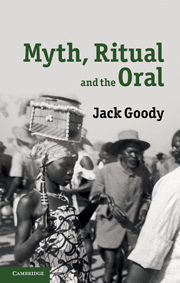Book contents
- Frontmatter
- Contents
- Acknowledgements
- Introduction
- 1 Religion and ritual from Tylor to Parsons: the definitional problem
- 2 Oral ‘literature’
- 3 The anthropologist and the audio recorder
- 4 Oral creativity
- 5 The folktale and cultural history
- 6 Animals, humans and gods in northern Ghana
- 7 The Bagre in all its variety
- 8 From oral to written: an anthropological breakthrough in storytelling
- 9 Writing and oral memory: the importance of the ‘lecto-oral’
- Appendix Folktales in northern Ghana
- References
- Index
9 - Writing and oral memory: the importance of the ‘lecto-oral’
Published online by Cambridge University Press: 05 June 2012
- Frontmatter
- Contents
- Acknowledgements
- Introduction
- 1 Religion and ritual from Tylor to Parsons: the definitional problem
- 2 Oral ‘literature’
- 3 The anthropologist and the audio recorder
- 4 Oral creativity
- 5 The folktale and cultural history
- 6 Animals, humans and gods in northern Ghana
- 7 The Bagre in all its variety
- 8 From oral to written: an anthropological breakthrough in storytelling
- 9 Writing and oral memory: the importance of the ‘lecto-oral’
- Appendix Folktales in northern Ghana
- References
- Index
Summary
The final chapter treats of the difference that writing makes to oral memorization. The practice of learning things ‘by heart’ seems to be a feature of written cultures, where sentences can be read over and over again, without variations, where you can learn to recite the Bible in a different way from the constantly changing Bagre.
With writing there is clearly the propensity to take over some activities hitherto carried out in the oral tradition and hence to change their character and their consequences. It is clear that when writing is introduced into a society there is at once an opening up of some new spheres of communication and a replacement of old ones by this new medium. I mean, for example, by ‘new spheres’ that a whole new mode of schooling and instruction is opened up, using writing boards, blackboards or textbooks as a basis for teaching, and creating a new institution, the school, and new personnel, the teachers, as well as their counterparts, the pupils (usually children). At the same time, indigenous forms of socialization inevitably suffer. Learning to live in society is partially removed from direct participation with kin and transferred to the classroom and the teacher. Obviously this change reduces communication between parent and child, which is predominantly by word of mouth in any culture, and increases the element of writing and reading, which is what school is primarily about.
Information
- Type
- Chapter
- Information
- Myth, Ritual and the Oral , pp. 153 - 161Publisher: Cambridge University PressPrint publication year: 2010
